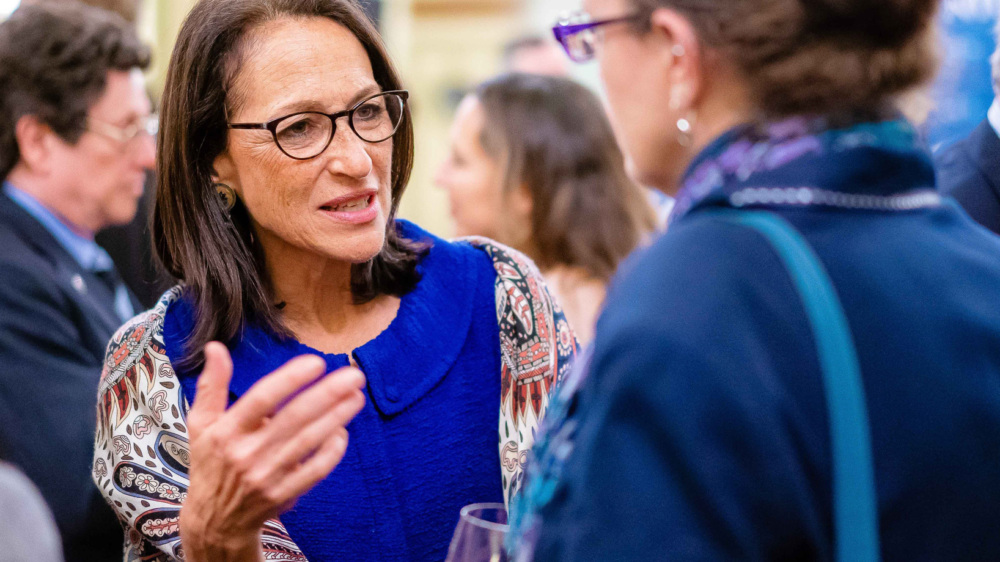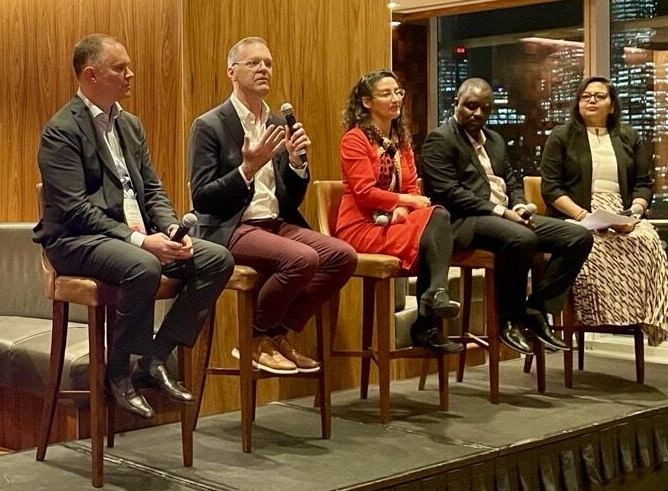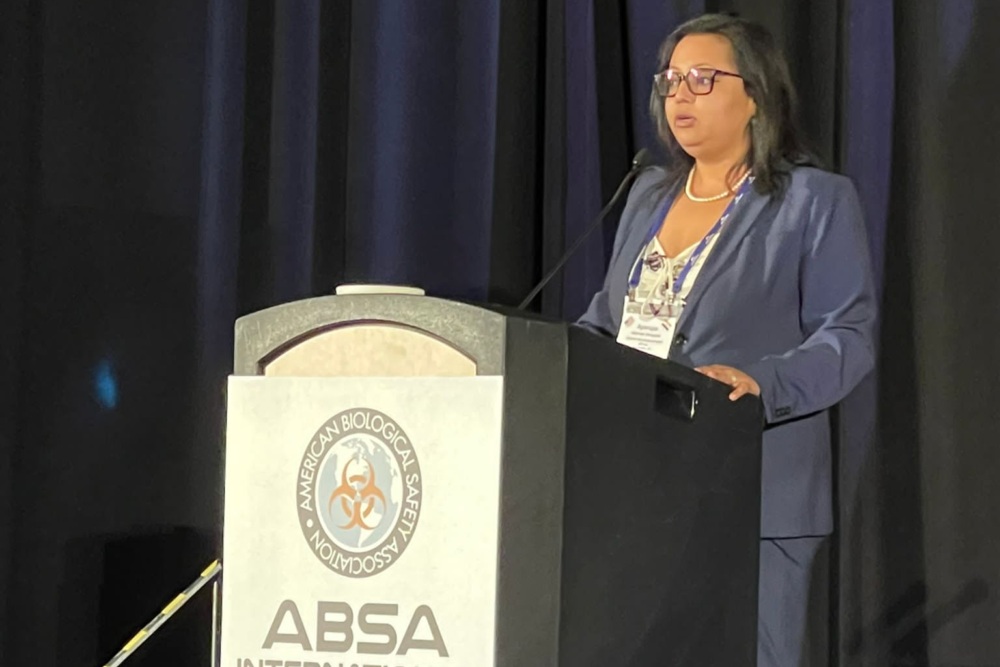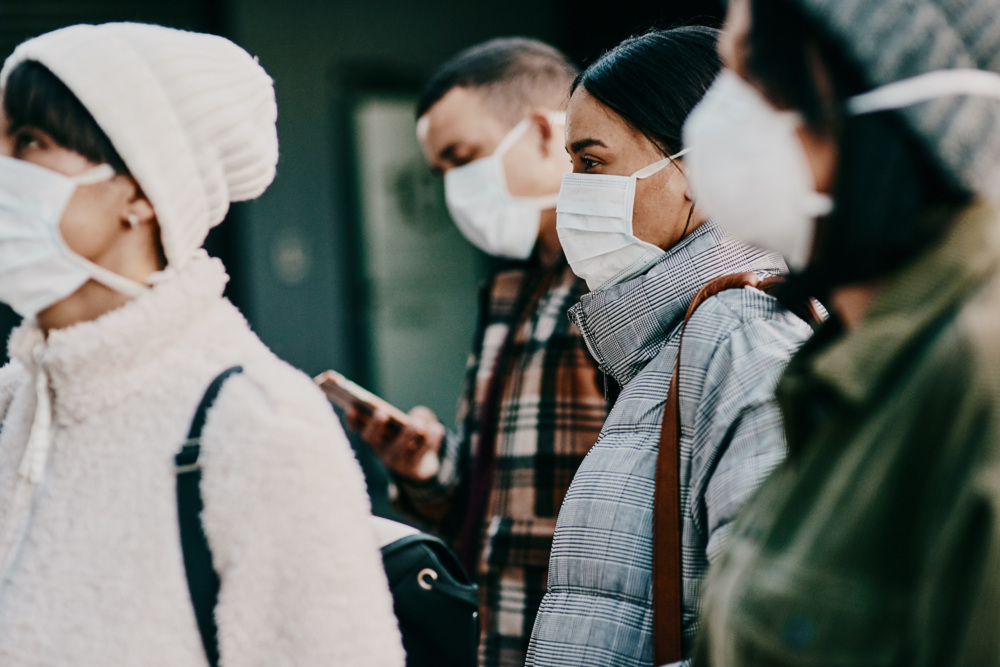
Mimi Hall
Vice President, Communications
Atomic Pulse
In 2001, following two decades of public service that took her from senior positions at the National Institute of Health to New York City’s Health Department to the U.S. Department of Health and Human Services, Dr. Margaret “Peggy” Hamburg joined the Nuclear Threat Initiative (NTI) as its founding vice president for Biological Programs and senior scientist. In 2009, she was nominated as Commissioner of the U.S. Food and Drug Administration, a position she held until early 2015. Among her many other distinctions, Hamburg also has served foreign secretary of the National Academy of Medicine, the health arm of the National Academy of Sciences, Engineering and Medicine, and she is an elected member of both the Council on Foreign Relations and the National Academy of Medicine. In 2017, she joined NTI’s Board of Directors.
Over the course of this year, as NTI marks its 20th anniversary, our experts will share some reflections on two decades of working to build a safer world—accomplishments and challenges, lessons learned along the way, visions for the future, and more. Today, we hear from Hamburg, who graciously agreed to rejoin NTI’s leadership in early 2021 to serve as interim vice president of NTI | bio following the departure of Beth Cameron, PhD.
NTI’s founders—Ted Turner and Sam Nunn—were primarily focused on addressing nuclear threats in 2001. How did it come about that the organization also would tackle biological threats?
Sam Nunn, from his work on Capitol Hill and on Cooperative Threat Reduction, was very concerned about the biological threat, with awareness about the magnitude of some bio-weapons programs that that had existed in the former Soviet Union and likely persisted. He understood how biology was evolving to make it possible that sub-national groups, including terrorists, might be able to get their hands on biological agents and manipulate them to do harm, so he wanted to have a focus not just on nuclear, but on other potential weapons of mass destruction, including biological.
When we discussed including a biological component within NTI, we knew there was wisdom in thinking about biological threats not just in terms of deliberate use but also related to the potential of mother nature as a terrorist, so to speak. Why? Because many of the systems for detection and response, along with preparedness, are the same for addressing deliberate, accidental, or naturally occurring threats. In addition, all of these different biological threats could have catastrophic implications for health, safety and security.
With so much at stake, what were your top priorities when you came on board to run NTI’s biological program?
My interests and concerns about biological threats evolved over time, beginning with the recognition during my medical training and then strongly reinforced when I worked at NIH and the Institute for Allergy and Infectious Diseases, that despite dramatic advances in science and technology that gave us new opportunities for vaccines and therapeutics to combat infectious diseases, we remained very vulnerable. During the course of my medical training, I watched a global pandemic unfold with HIV/AIDS, and my early work was focused on trying to address that concern, including the development of novel therapeutics.
Later, while I was New York City Health Commissioner, we experienced the 1993 bombing of the World Trade Center, which is often forgotten in light of the greater magnitude of 9/11. But for me, it was a powerful event, bringing home the reality of domestic terrorism. It was at that time that I really started to learn much more about biological terrorism and biological weapons programs in development in other parts of the world.
So, fast-forward to 2001, and at NTI we launched some very important programs to help build greater awareness and support for the notion that that health and security had to be addressed together, that they were intimately intertwined. By focusing on health programs, not only could you enhance security more broadly, you also could create conditions to reduce tensions and conflict among countries or peoples where there was a history of distrust or even violence and conflict. The Middle East Consortium on Infectious Disease Surveillance (MECIDS) was a good example of countries in a state of constant tension recognizing that by coming together to address infectious diseases, they could develop a coordinated approach to improve health and reduce disease risks. The added benefit was that the work could lead to an environment where people that were historically suspicious of each other and untrusting could work together, build systems together, and come to trust and depend on one another, around a set of shared goals and benefits. MECIDS really was a groundbreaking and enormously successful program.
Our work to help create the NTI-WHO Global Emergency Outbreak Response Fund also was very important because the World Health Organization (WHO) is such an important partner in the global public health landscape, yet historically, it has been very underfunded. The WHO needed the resources to immediately mobilize to respond and investigate an outbreak, wherever it might be occurring and from whatever cause. The fact that it didn’t have those resources was very troubling. We decided to help them build a mechanism so that they wouldn’t have to pass the hat raising money before they could mobilize to go in and help with an outbreak investigation. This was vitally important, since time is of the essence in identifying the source of an outbreak and efforts to control ongoing spread. Also, as we have seen with respect to the emergence of COVID, it’s crucial early on to do the right kind of investigation in order to be able to identify the source successfully. So, creating a revolving fund was important, and it was a good example of how NTI, as a small organization, could provide important leadership and visibility around key issues and how we could leverage other resources. By creating a revolving fund, we sort of showed the way. We shone the light on an unmet need, and then we were able to galvanize others. That fund has been increased in size and turned over many, many times since we started it.
Today, NTI’s biological program is more robust than ever and is making a real difference in the field of biosecurity at a critical time. NTI | bio is developing systemic approaches to reduce biotechnology risks, working to strengthen global biosecurity capacity, building accountability for national health security, establishing stronger international systems to mitigate catastrophic biological risks, and much more. These are major projects that bring together a wide range of stakeholders and global partners. It must be gratifying to see how far the program has come.
It is wonderful to see how the NTI | Bio program has evolved now over two decades, and I think has really demonstrated its unique contribution to the fields of global public health and security. Without a doubt the work of NTI has helped deepen understanding of the nexus between health and security. Long before COVID, NTI was speaking to the importance of the biological threat and the need to better prepare, along with the need to engage across disciplines, across sectors, and across borders. That vision helped advance critical programs and activities that could be mobilized in the face of COVID.
COVID-19 also showed us how much more work there is to be done, so I think the role of NTI is more important than ever. We must continue to advance this important work, enhancing understanding around the complexities of infectious disease threats that can be naturally occurring or deliberately caused, and strengthening insights and action with respect to biosecurity in ways that engage all partners and stakeholders to make a real and enduring difference.
Do you feel hopeful about the future of pandemic preparedness and biosecurity? Do you think we will learn from the COVID-19 crisis and implement the large-scale changes required to prevent the next one?
I think we have to be realistic about the nature of this threat, and that it will continue. In fact, the next biological threat could well be even more catastrophic. We will emerge from COVID having learned a lot, but we cannot relax our guard. Instead, we have to redouble our efforts.
I think NTI has a critical leadership role to play here, in terms of maintaining the focus and commitment from the scientific community and political leadership. We have to build political will so that we continue to make progress and apply new knowledge to address the challenges before us. We must think about it in terms of preventing problems before they occur and ensuring rapid response to control problems wherever they emerge. NTI recognizes that we live in a globalized, complex world, and solutions to the threats of today and the future require us to work together to make a better, safer world.
Sign up for our newsletter to get the latest on nuclear and biological threats.
NTI is committed to highlighting and supporting LGBTQ+ voices in national security during Pride Month and beyond. Sarah Stern, NTI’s Global Biological Policy and Programs intern, had the opportunity to speak with Dr. Andrew Hebbeler, the inaugural Director of Biosecurity at the Coalition for Epidemic Preparedness Innovations (CEPI) and former Senior Director of Global Biological Policy and Programs at NTI, about the importance of diversity in biosecurity work and how he views his personal leadership style.
NTI | bio Senior Program Officer Dr. Aparupa Sengupta on why efforts to strengthen global biosafety and biosecurity must prioritize diversity and inclusion.
NTI is working with international partners to develop a new Joint Assessment Mechanism (JAM) within the office of the UN Secretary-General to rapidly identify outbreak origins. Without the ability to quickly determine the origin of an outbreak, researchers are hampered in their ability to rapidly develop vaccines and other medical countermeasures that can slow the pace of the outbreak, ultimately saving countless lives.



